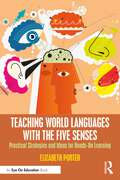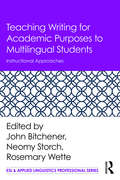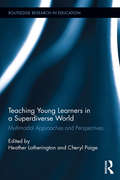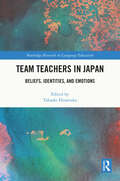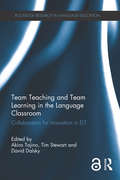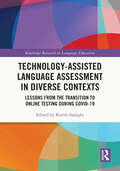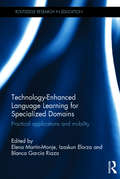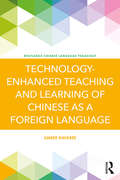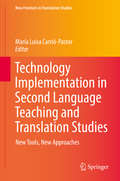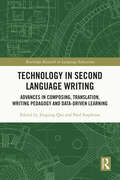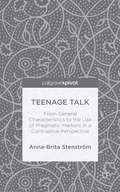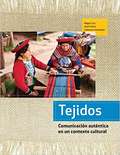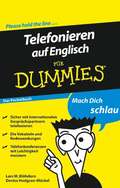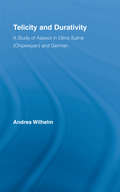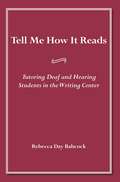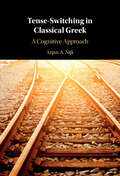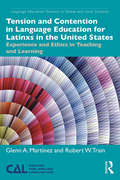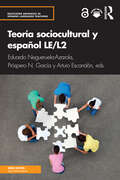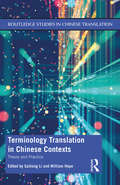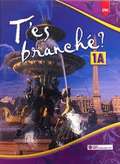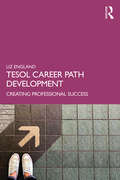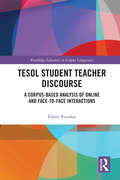- Table View
- List View
Teaching World Languages with the Five Senses: Practical Strategies and Ideas for Hands-On Learning
by Elizabeth PorterWith this fun, practical guide, you will have everything you need to re-envision and reinvigorate your world language classroom. Author Elizabeth Porter draws on a brain-based approach to show how language learning is a sensory experience. Students can effectively learn languages and improve retention through activities and lessons that incorporate the five senses – sight, hearing, taste, touch, and smell. Chapters include real-world, research-backed examples and classroom strategies and activities ready for use. An essential resource for world language teachers, this book introduces language learning philosophy and an out-of-the-box, effective approach that uses neuroscience combined with best practices to promote a highly engaging language learning environment.
Teaching World Languages with the Five Senses: Practical Strategies and Ideas for Hands-On Learning
by Elizabeth PorterWith this fun, practical guide, you will have everything you need to re-envision and reinvigorate your world language classroom. Author Elizabeth Porter draws on a brain-based approach to show how language learning is a sensory experience. Students can effectively learn languages and improve retention through activities and lessons that incorporate the five senses – sight, hearing, taste, touch, and smell. Chapters include real-world, research-backed examples and classroom strategies and activities ready for use. An essential resource for world language teachers, this book introduces language learning philosophy and an out-of-the-box, effective approach that uses neuroscience combined with best practices to promote a highly engaging language learning environment.
Teaching Writing for Academic Purposes to Multilingual Students: Instructional Approaches (ESL & Applied Linguistics Professional Series)
by John Bitchener Neomy Storch Rosemary WetteExamining what is involved in learning to write for academic purposes from a variety of perspectives, this book focuses in particular on issues related to academic writing instruction in diverse contexts, both geographical and disciplinary. Informed by current theory and research, leading experts in the field explain and illustrate instructional programs, tasks, and activities that help L2/multilingual writers develop knowledge of different genres, disciplinary expectations, and expertise in applying what they have learned in both educational and professional contexts.
Teaching Young Learners in a Superdiverse World: Multimodal Approaches and Perspectives (Routledge Research in Education #190)
by Heather Lotherington Cheryl PaigeThis book documents a collaborative action research project in one school where researchers and practitioners worked together to develop multimodal literacies and pedagogies for diverse, multilingual elementary classrooms. Following chronologically from Lotherington’s Pedagogy of Multiliteracies (2011), this volume picks up after teachers and researchers have learned how to work efficiently as a learning community to offer project-based learning approaches. This edited collection relates how teachers and students of different grade levels, language backgrounds, and abilities developed a shared agenda and created a framework for effective and inclusive practices. Contributors demonstrate that collaboration, creative pedagogical solutions and innovative project-based learning are all essential parts of learning and teaching socially appropriate and responsive literacies in a multimodal, superdiverse world.
Team Teachers in Japan: Beliefs, Identities, and Emotions (Routledge Research in Language Education)
by Takaaki HiratsukaThis book provides insights into the professional and personal lives of local language teachers and foreign language teachers who conduct team-taught lessons together. It does this by using the Japanese context as an illustrative example. It re-explores in this context the professional experiences and personal positionings of Japanese teachers of English (JTEs) and foreign assistant language teachers (ALTs), as well as their team-teaching practices in Japan. This edited book is innovative in that 14 original empirical studies offer a comprehensive overview of the day-to-day professional experiences and realities of these team teachers in Japan, with its focus on their cognitive, ideological, and affective components. This is a multifaceted exploration into team teachers in their gestalt—who they are to themselves and in relation to their students, colleagues, community members, and crucially to their teaching partners. This book therefore offers several empirical and practical applications for future endeavors involving team teachers and those who engage with them—including their key stakeholders, such as researchers on them, their teacher educators, local boards of education, governments, and language learners from around the world.
Team Teaching and Team Learning in the Language Classroom: Collaboration for innovation in ELT (Routledge Research in Language Education)
by Akira Tajino Tim Stewart David DalskyThis book reignites discussion on the importance of collaboration and innovation in language education. The pivotal difference highlighted in this volume is the concept of team learning through collaborative relationships such as team teaching. It explores ways in which team learning happens in ELT environments and what emerges from these explorations is a more robust concept of team learning in language education. Coupled with this deeper understanding, the value of participant research is emphasised by defining the notion of ‘team’ to include all participants in the educational experience. Authors in this volume position practice ahead of theory as they struggle to make sense of the complex phenomena of language teaching and learning. The focus of this book is on the nexus between ELT theory and practice as viewed through the lens of collaboration. The volume aims to add to the current knowledge base in order to bridge the theory-practice gap regarding collaboration for innovation in language classrooms.
Technology-Assisted Language Assessment in Diverse Contexts: Lessons from the Transition to Online Testing during COVID-19 (Routledge Research in Language Education)
by Karim SadeghiThis timely collection explores the role of digital technology in language education and assessment during the COVID-19 pandemic. It recognises the unique pressures which the COVID-19 pandemic placed on assessment in language education, and examines the forced shift in assessment strategies to go online, the existing shortfalls, as well as unique affordances of technology-assisted L2 assessment. By showcasing international examples of successful digital and computer-assisted proficiency and skills testing, the volume addresses theoretical and practical concerns relating to test validity, reliability, ethics, and student experience in a range of testing contexts. Particular attention is given to identifying lessons and implications for future research and practice, and the challenges of implementing unplanned computer-assisted language assessment during a crisis. Insightfully unpacking the ‘lessons learned’ from COVID and its impact on the acceleration of the shift towards online course and assessment delivery, it offers important guidelines for navigating assessment in different instructional settings in times of crisis. It will appeal to scholars, researchers, educators, and faculty with interests in educational measurement, digital education and technology, and language assessment and testing.
Technology-Enhanced Language Learning for Specialized Domains: Practical applications and mobility (Routledge Research in Education)
by Elena Martín-Monje Izaskun Elorza Blanca García RiazaTechnology-Enhanced Language Learning for Specialized Domains provides an exploration of the latest developments in technology-enhanced learning and the processing of languages for specific purposes. It combines theoretical and applied research from an interdisciplinary angle, covering general issues related to learning languages with computers, assessment, mobile-assisted language learning, the new language massive open online courses, corpus-based research and computer-assisted aspects of translation. The chapters in this collection include contributions from a number of international experts in the field with a wide range of experience in the use of technologies to enhance the language learning process. The essays have been brought together precisely in recognition of the demand for this kind of specialised tuition, offering state-of-the-art technological and methodological innovation and practical applications. The topics covered revolve around the practical consequences of the current possibilites of mobility for both learners and teachers, as well as the applicability of updated technological advances to language learning and teaching, particularly in specialized domains. This is achieved through the description and discussion of practical examples of those applications in a variety of educational contexts. At the beginning of each thematic section, readers will find an introductory chapter which contextualises the topic and links the different examples discussed. Drawing together rich primary research and empirical studies related to specialized tuition and the processing of languages, Technology-Enhanced Language Learning for Specialized Domains will be an invaluable resource for academics, researchers and postgraduate students in the fields of education, computer assisted language learning, languages and linguistics, and language teaching.
Technology-Enhanced Teaching and Learning of Chinese as a Foreign Language
by Amber NavarreTechnology-Enhanced Teaching and Learning of Chinese as a Foreign Language provides new and experienced teachers of Chinese with a timely review and evaluation of the use of technology in the language classroom. The book draws from Second Language Acquisition theories and empirical studies to demonstrate the use of technologies in facilitating language learning. With a strong practical and pedagogical focus, this is an ideal resource for current and prospective teachers of Chinese as a Foreign Language. Key features include: Demonstration and analysis of technologies in use Principles and methods to evaluate instructional technologies Summary tables presenting the key functions of each technology tool Online resources include up-to-date information on new technologies and tools to address the ever-changing nature of the topic.
Technology Implementation in Second Language Teaching and Translation Studies
by María Luisa Carrió-PastorThis monograph mainly focuses on the idea that language teaching in higher education involves making use of new approaches and technology. It identifies the key determinants of the materials needed to improve language teaching on the basis of the actual experimental research included in the respective contributions. Thanks to its unique perspective, the book offers a distinctive approach to addressing empirical research on second language teaching, translator training and technology. As universities are some of the best arenas for analyzing teaching techniques for various subjects, higher education teachers can use this book to thoroughly prepare for the application of pilot studies and learn more about students' responses to new teaching and translation techniques. An enlightening guide for scholars and students with an academic interest in acquiring the basic principles of language teaching and translation, this book mainly provides actual cases in which the implementation of technology was useful to second language teachers and translation trainers. As the authors are experienced scholars, readers will not only come to understand how to use new teaching strategies, but also discover that the proposals described in each chapter can be useful to any level of second language training for teachers and translators.
Technology in Second Language Writing: Advances in Composing, Translation, Writing Pedagogy and Data-Driven Learning (Routledge Research in Language Education)
by Jingjing Qin Paul StapletonThis edited volume showcases state-of-the-art research in technological applications in second language writing. It examines multimodal composing, digital feedback, data-driven learning, machine translation and technological applications in writing pedagogy. Technology in Second Language Writing reflects the rapidly changing field of technology in second language learning and highlights technological advances across different areas relevant to L2 writing. Composed of empirical studies, reviews, and descriptive essays, this book covers a variety of topics across the areas of composing, pedagogy, and writing research. It includes discussion of computer-mediated communication, language learners’ perceptions about using technology in their writing, the use of social media in writing, corpus learning, translation software, and use of electronic feedback in language classrooms. Offering a multifaceted approach to technology in a wide variety of second language writing contexts, this cutting-edge book serves as essential reading for scholars and postgraduate students in the field of language teaching, applied linguistics, and TESOL.
Teenage Talk: From General Characteristics to the Use of Pragmatic Markers in a Contrastive Perspective
by Anna-Brita StenströmThis in-depth study of the use of pragmatic markers by Spanish and English teenagers offers insight into the currently under-investigated area of teenage talk through the analysis of the Corpus Oral de Lenguaje Adolescente de Madrid and The Bergen Corpus of London Teenage Talk.
Tejidos: Comunicación Auténtica En Un Contexto Cultural
by Megan Cory Janet Parker Catherine SchwenklerNIMAC-sourced textbook
Telefonieren auf Englisch fur Dummies Das Pocketbuch (Für Dummies)
by Dr. Lars M. Blöhdorn Denise Hodgson-MöckelNach der Lektüres dieses Buches werden Sie entspannt zum Hörer greifen, wenn Sie wieder einmal geschäftlich auf Englisch telefonieren müssen. Sie erfahren, wie Sie sich vorstellen, wie Sie nachfragen, wie Sie Small Talk treiben und wie Sie sich verabschieden. Die Autoren geben Ihnen für alle möglichen Gesprächssituationen die wichtigsten Vokabeln an die Hand. Vereinbaren Sie Termine, nehmen Sie Nachrichten entgegen, sprechen Sie auf einen Anrufbeantworter, nehmen Sie an Telefonkonferenzen teil.
Telicity and Durativity: A Study of Aspect in Dëne Suliné (Chipewyan) and German (Outstanding Dissertations in Linguistics)
by Andrea Luise WilhelmThis book studies the linguistic representation of events by examining the relevance of two salient event characteristics-- telicity and durativity-- to the grammatical system of natural language. The study of events, and of event characteristics, is an important testing ground for theories on the boundary between extralinguistic and linguistic knowledge, and on the relation between semantics and syntax. Telicity and durativity are notions which have become increasingly influential in both the semantic and the syntactic, i.e., grammaticalized, representation of events. The book furthers the understanding of events through the comparison of two genetically and typologically distinct languages, German and Dëne Suliné (Chipewyan/Athapaskan), an indigenous language of Northwestern Canada. It contains the first in-depth documentation of the aspectual system of Dëne Suliné, and a careful analysis of the aspectual behaviour of German particle verbs. A stringent methodology considers semantic, pragmatic, and grammatical factors in both languages. The data reveal that telicity and durativity belong to profoundly different semantic and grammatical domains, and that neither notion is grammaticalized universally. While both notions are represented semantically in German as well as in Dëne Suliné, telicity is grammaticalized only in the former and durativity is grammaticalized only in the latter.
Tell Me How It Reads: Tutoring Deaf and Hearing Students in the Writing Center
by Rebecca Day BabcockDeaf students are attending mainstream postsecondary institutions in increasing numbers, raising the stakes for the complicated and multifaceted task of tutoring deaf students at these schools. Common tutoring practices used with hearing students do not necessarily work for deaf people. Rebecca Day Babcock researched and wrote Tell Me How It Reads: Tutoring Deaf and Hearing Students in the Writing Center to supply writing instructors an effective set of methods for teaching Deaf and other students how to be better writers. Babcock's book is based on the resulting study of tutoring writing in the college context with both deaf and hearing students and their tutors. She describes in detail sessions between deaf students, hearing tutors, and the interpreters that help them communicate, using a variety of English or contact signing rather than ASL in the tutorials. These experiences illustrate the key differences between deaf-hearing and hearing-hearing tutorials and suggest ways to modify tutoring and tutor-training practices accordingly. Although this study describes methods for tutoring deaf students, its focus on students who learn differently can apply to teaching writing to Learning Disabled students, ESL students, and other students with different learning styles. Ultimately, the well-grounded theory analysis within Tell Me How It Reads provides a complete paradigm for tutoring in all writing centers.
TEMAS: AP Spanish Language And Culture
by Parthena Draggett Cole Conlin Max EhrsamNIMAC-sourced textbook
Tense-Switching in Classical Greek: A Cognitive Approach
by Arjan A. NijkTense is at its most interesting when it behaves badly. In this book Arjan Nijk investigates the variation between the past and present tenses to refer to past events in Classical Greek and beyond. Adopting a cognitive approach to the issue, he argues that the use of the present for preterite depends on the activation of implicit conceptual scenarios in which the gap between the past and the present is bridged. The book is distinguished from previous accounts by its precision in describing these conceptual scenarios, the combination of linguistic theorising with philological and statistical methods, the size of the corpus under investigation and the explicitly cross-linguistic scope. It provides a complete overview of the phenomenon of tense switching in Classical Greek, as well as new theoretical perspectives on deixis and viewpoint, and is important for classicists, narratologists and linguists of every stamp.
Tension and Contention in Language Education for Latinxs in the United States: Experience and Ethics in Teaching and Learning (Language Education Tensions in Global and Local Contexts)
by Glenn A. Martínez Robert W. TrainApplying a critical lens to language education, this book explores the tensions that Latinx students face in relation to their identities, social and institutional settings, and other external factors. Across diverse contexts, these students confront complex debates and contestable affirmations that intersect with their lived experiences and social histories. Martinez and Train highlight the pedagogic and ethical urgency of teacher responsibility, learner agency and social justice in critically addressing the consequences, constraints, and affordances of the language education that Latinx students experience in historically-situated and institutionally defined spaces of practice, ideology and policy. Reframing language studies to take into account the roles of power, inequality, and social settings, this book provokes dialogue between areas of language education that rarely interface. Through privileging the learner experience, the book provides a window to the contested spaces across language education and generates new opportunities for engagement and action. Offering nuanced and insightful analyses, this book is ideal for scholars, language researchers, language teacher educators and graduate students in all areas of language education.
Teoría sociocultural y español LE/L2 (Routledge Advances in Spanish Language Teaching)
by Eduardo Negueruela-Azarola Próspero N. García Arturo EscandónTeoría sociocultural y español LE/L2 es una introducción académica a conceptos clave de la teoría sociocultural aplicada a la enseñanza y el aprendizaje de español como segunda lengua y lengua extranjera. Los capítulos han sido escritos por expertos de todo el mundo, tanto por investigadores y profesores de larga trayectoria como por nuevos investigadores. La obra ofrece una revisión detallada del impacto de las ideas socioculturales en la enseñanza y aprendizaje de español. Es el primer libro que se publica en español con este enfoque. En sus páginas se documenta la transformación que el enfoque sociocultural está produciendo en la enseñanza-aprendizaje de segundas lenguas, en su investigación y evaluación, y en la formación docente. La obra concibe el aprendizaje y el desarrollo como actividades socioculturales e interpersonales, y destaca el objetivo de la evaluación y de la investigación como herramientas de intervención dinámica para el aprendizaje y crecimiento y, finalmente, cómo un enfoque sociocultural ilumina la importancia de la mediación en los procesos de aprendizaje y desarrollo de la persona. El volumen tiene las siguientes características: Incluye una entrevista con James P. Lantolf, uno de los investigadores más prominentes de la teoría sociocultural aplicada a las segundas lenguas. Un uso consistente de la terminología de la teoría sociocultural en español a lo largo de toda la obra. Cada capítulo tiene una estructura homogénea, lo cual facilita su consulta. No reproduce la literatura existente en inglés, sino que desarrolla propuestas teóricas y de investigación propias y novedosas. Incluye un glosario, disponible en línea, de términos relevantes en la teoría sociocultural con breves definiciones. Diseñado y pensado para aquellos sin conocimientos previos de la teoría, Teoría sociocultural y español LE/L2 ofrece explicaciones claras y accesibles sobre la TSC acompañadas de ejemplos concretos y aplicaciones prácticas para la clase de lenguas. Es un recurso esencial para cualquiera que enseñe español LE/L2, así como para quienes investiguen su adquisición. Teoría sociocultural y español LE/L2 introduces the key concepts of sociocultural theory (SCT) as they apply to the teaching and acquisition of Spanish as a second and foreign language. Contributions from leading experts from across the globe, both well-established and emerging scholars, offer an in-depth view of how a sociocultural approach can impact the teaching and learning of Spanish. The first book on this subject to be written in Spanish, this unique volume examines the transformation that sociocultural ideas are producing and conceives learning and development as sociocultural and interpersonal activities. It highlights the objective of evaluation and research as dynamic intervention tools for learning and growth, the active role learners must play, and how a sociocultural approach illuminates the importance of mediation in the learning and development processes of the individual. Key features include: An interview with James P. Lantolf, one of the most prominent researchers in SCT applied to second languages A consistent use of sociocultural theory terminology in Spanish throughout A homogeneous chapter structure which makes it easy to consult Its own newly developed theoretical and research proposals An online glossary of relevant terms in sociocultural theory with brief definitions. Designed for those with no prior knowledge of the subject area, Teoría sociocultural y español LE/L2 provides straightforward and accessible explanations of SCT accompanied by specific and practical applications for the language classroo
Teoría sociocultural y español LE/L2 (Routledge Advances in Spanish Language Teaching)
by Eduardo Negueruela-Azarola Próspero N. García Arturo EscandónTeoría sociocultural y español LE/L2 es una introducción académica a conceptos clave de la teoría sociocultural aplicada a la enseñanza y el aprendizaje de español como segunda lengua y lengua extranjera. Los capítulos han sido escritos por expertos de todo el mundo, tanto por investigadores y profesores de larga trayectoria como por nuevos investigadores. La obra ofrece una revisión detallada del impacto de las ideas socioculturales en la enseñanza y aprendizaje de español.Es el primer libro que se publica en español con este enfoque. En sus páginas se documenta la transformación que el enfoque sociocultural está produciendo en la enseñanza-aprendizaje de segundas lenguas, en su investigación y evaluación, y en la formación docente. La obra concibe el aprendizaje y el desarrollo como actividades socioculturales e interpersonales, y destaca el objetivo de la evaluación y de la investigación como herramientas de intervención dinámica para el aprendizaje y crecimiento y, finalmente, cómo un enfoque sociocultural ilumina la importancia de la mediación en los procesos de aprendizaje y desarrollo de la persona.El volumen tiene las siguientes características: Incluye una entrevista con James P. Lantolf, uno de los investigadores más prominentes de la teoría sociocultural aplicada a las segundas lenguas Un uso consistente de la terminología de la teoría sociocultural en español a lo largo de toda la obra Cada capítulo tiene una estructura homogénea, lo cual facilita su consulta No reproduce la literatura existente en inglés, sino que desarrolla propuestas teóricas y de investigación propias y novedosas Incluye un glosario, disponible en línea, de términos relevantes en la teoría sociocultural con breves definiciones Diseñado y pensado para aquellos sin conocimientos previos de la teoría, Teoría sociocultural y español LE/L2 ofrece explicaciones claras y accesibles sobre la TSC acompañadas de ejemplos concretos y aplicaciones prácticas para la clase de lenguas. Es un recurso esencial para cualquiera que enseñe español LE/L2, así como para quienes investiguen su adquisición.Chapter 4 of this book is freely available as a downloadable Open Access PDF at http://www.taylorfrancis.com under a Creative Commons Attribution-Non Commercial-No Derivatives (CC-BY-NC-ND) 4.0 license.Teoría sociocultural y español LE/L2 introduces the key concepts of sociocultural theory (SCT) as they apply to the teaching and acquisition of Spanish as a second and foreign language. Contributions from leading experts from across the globe, both well-established and emerging scholars, offer an in-depth view of how a sociocultural approach can impact the teaching and learning of Spanish.The first book on this subject to be written in Spanish, this unique volume examines the transformation that sociocultural ideas are producing and conceives learning and development as sociocultural and interpersonal activities. It highlights the objective of evaluation and research as dynamic intervention tools for learning and growth, the active role learners must play, and how a sociocultural approach illuminates the importance of mediation in the learning and development processes of the individual.Key features include: An interview with James P. Lantolf, one of the most prominent researchers in SCT applied to second languages A consistent use of sociocultural theory terminology in Spanish throughout A homogeneous chapter structure which makes it easy to consult Its own newly developed theoretical and research proposals An online glossary of relevant terms in sociocultural theory with brief definitions Designed for those with no prior knowledge of the subject area, Teoría sociocultural y español LE/L2 provides straightforward and accessible explanations of SCT accompanied by specific and practical applications for the language classroom. It is an essential resource for anyone
Terminology Translation in Chinese Contexts: Theory and Practice (Routledge Studies in Chinese Translation)
by Saihong Li William HopeTerminology Translation in Chinese Contexts: Theory and Practice investigates the theory and practice of terminology translation, terminology management, and scholarship within the distinctive milieu of Chinese and explores the complex relationship between terminology translation (micro level) and terminology management (macro level). This book outlines the contemporary challenges of terminology translation and terminology management within Chinese contexts in specialized fields including law, the arts, religion, Chinese medicine, and food products. The volume also examines how the development and application of new technologies such as big data, cloud computing, and artificial intelligence have brought about major changes in the language service industry. Technology such as machine translation and computer-assisted translation has spawned new challenges in terminology management practices and has facilitated their evolution in contexts of ever greater internationalization and globalization. This book recontextualizes terminology translation and terminology management with a special focus on English–Chinese translation. It is hoped that the volume will enable and enhance dialogue between Chinese and Western scholars and professionals in the field. All chapters have been written by specialists in the different subfields and have been peer-reviewed by the editors.
TESOL Career Path Development: Creating Professional Success
by Liz EnglandThis book addresses a wide range of issues and obstacles that teachers in native and non-native English-speaking countries face in teaching English language learners of all ages, at all levels of proficiency, and in a variety of program settings. The book introduces a model of milestones for career path development specific to the specialized needs and skills of the TESOL (Teaching English to Speakers of Other Languages) community that caters to the many unique challenges faced by teachers at a range of experience levels, from preservice and novice teachers to veteran and semi-retired professionals. Taking an interdisciplinary approach and drawing on the voices and experiences of TESOL scholars, England demonstrates how best to apply one’s education, background, and experiences to individuals who work in the field of TESOL, and offers unique tools, strategies, and training techniques. This book provides a clear and engaging framework for scholars and teachers at any stage in one’s career to grow and develop professionally in fast-changing and increasingly complex professional climates. This book is ideal for scholars, graduate students, and researchers in TESOL and language teaching, as well as scholars and researchers in international teacher development and language.
TESOL Student Teacher Discourse: A Corpus-Based Analysis of Online and Face-to-Face Interactions (Routledge Advances in Corpus Linguistics)
by Elaine RiordanThis book explores the use of online and face-to-face interactions in language teacher education (LTE) by assessing the formation and practices of a community of practice (CoP), and evaluating the roles discussions between student teachers and a peer tutor can play in terms of identity formation, articulating narratives, reflective practices, and maintaining affective relationships. The specific context within which this is embedded is a Teaching English to Speakers of Other Languages (TESOL) programme, often known as English Language Teaching (ELT), at a third-level Irish institution. The data drawn on come from student teachers on a master’s (MA) programme who interacted with a peer tutor (the researcher) via a number of modes (face-to-face and online). The approach to data analysis is a corpus-based discourse analytical one, which examines the linguistic features of student teacher and peer tutor talk; the features of CoP practices in the discourse; and how different modes of communication shape the nature of this discourse. Perceptive data from the student teachers is used to outline their reactions to the modes of communication and the activities they participated in.
